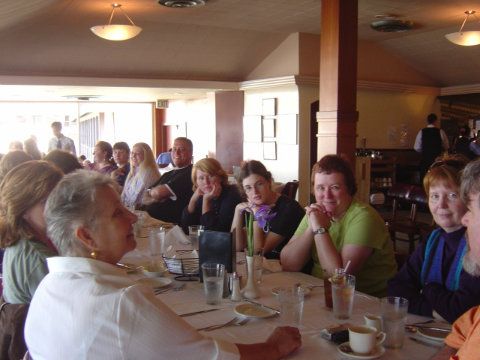In his impassioned description of the Glittering Caves to Legolas, Gimli refers to "Queen Galadriel". However, that is of course a misnomer; Galadriel is simply the Lady of Lothlórien, not its Queen. In the material published in the History of Galadriel and Celeborn section of Unfinished Tales, Tolkien goes to great lengths to make it clear that she is not a Queen. Of course her and Celeborn's history -- and that of Amroth King of Lórien -- is very muddled, but Tolkien seems pretty clear on this point. He writes:
And again in another text:After the disaster in Moria [in the year 1980] and the sorrows of Lórien, which was now left without a ruler (for Amroth was drowned in the sea in the Bay of Belfalas and left no heir), Celeborn and Galadriel returned to Lórien, and were welcomed by the people. There they dwelt while the Third Age lasted, but they took no title of King or Queen; for they said that they were only guardians of this small but fair realm, the last eastward outpost of the Elves.
So the question is, why did they not take the title of King or Queen? More specifically, why did Galadriel (clearly the more powerful of the two) not take the title of Queen?In her wisdom Galadriel saw that Lórien would be a stronghold and point of power to prevent the Shadow from crossing the Anduin in the war that must inevitably come before it was again defeated (if that were possible); but that it needed a rule of greater strength and wisdom than the Silvan folk possessed. Nevertheless, it was not until the disaster in Moria, when by means is beyond the foresight of Galadriel Sauron's power actually crossed the Anduin and Lórien was in great peril, its king lost, its people fleeing and likely to leave it deserted to likely occupied by Orcs, that Galadriel and Celeborn took up their permanent abode in Lórien, and its government. But they took no title of King or Queen, and were the guardians that in the event brought it unviolated through the War of the Ring.
She certainly comes from a royal family. Her paternal grandfather was King of all the Noldor, before his murder by Morgoth. Her maternal grandfather was King of the Teleri in Valinor. Her father was King of the Noldor that remained in Valinor. Her brother Finrod was King of Nargothrond, and he was followed by (depending on which version you choose) her other brother or her nephew, Orodreth. Her uncle Fingolfin and her cousin Finrod were Kings of the Noldor in Middle-earth, and her other cousin Turgon was King of Gondolin. Thingol, King of Doriath and of Beleriand was her great-uncle. And Gil-galad the High-King was either her cousin or her grand-nephew. And, of course, her granddaughter Arwen became Queen Arwen of Gondor and Arnor.
And she certainly had the skills and wisdom to be a Queen. She is, in fact, accounted to be, along with Fëanor, the greatest of all of the Eldar of Valinor. She was, as Tolkien says in the Shibboleth of Fëanor, "the greatest of the Noldor, except Fëanor maybe, though she was wiser than he, and her wisdom increased with the long years." So why not Queen Galadriel?
I think we see a glimpse of the answer in her words to Frodo when he offers her the Ring:
I think that these words show that Galadriel has thought about this alot, and that she recognized the danger of her being called Queen. Even without the One Ring, I think she recognizes the danger of her taking on the mantle of royalty. Tolkien is of course a big proponent of monarchy as a mode of government, as is seen in Aragorn's example. But it is interesting to see that the greatest of all of the children of Eru, Galadriel, Fëanor, and Lúthien, never become monarchs. Fëanor is overcome by his own pride, and need for revenge, before he can ever take up the mantle left by his father. Lúthien, I suppose, gives up the right to be her father's heir for love of Beren, leaving Dior as Thingol's Heir. And, perhaps, Galadriel is wise enough to realize that she is too powerful to become a Queen without the danger of the power inherent in such a title combining with her own inherent power to become too much of a corrupting force.In place of the Dark Lord you will set up a Queen. And I shall not be dark, but beautiful and terrible as the Morning and the Night! Fair as the Sea and the Sun and the Snow upon the Mountain! Dreadful as the Storm and the Lightning! Stronger than the foundations of the earth. All shall love me and despair!
Maybe. What do you think?

